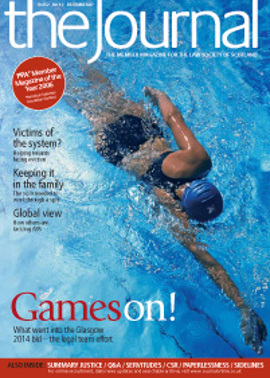"This ain't tiddlywinks, mate"

A recent decision of the French courts has caused concern in rugby, with the ruling that an injury sustained by French player Aurelien Rougerie from a challenge by Englishman Phil Greening, should result in 40,500 euro compensation. There is little difficulty in the finding that Rougerie’s initial injury was caused by Greening’s actions; however there has been considerable debate concerning the finding of liability in compensation.
Hand-off stand-off
Rougerie, a French international, played wing for club side Clermont-Ferrand. Greening was hooker for London Wasps. During a pre-season fixture in August 2002 in France, Greening, attacking and carrying the ball, made contact with Rougerie’s throat. Rougerie was injured and subsequently had three operations on his larynx, an abscess following the initial operation complicating matters. He returned to competitive rugby 12 weeks later. Rougerie sued in the French civil courts, calculating his losses at approximately 90,000 euro. The cour d’assis made its award on 16 November 2007, ruling that Greening had fouled Rougerie “both technically and against the spirit of the game”.
It has been widely claimed on Greening’s behalf that he did nothing more than perform a classic “hand-off” move – an attempt to repel the advances of a tackling player by pushing, sometimes very forcefully, the defender from the attacker. As a result, Rougerie has been widely vilified for seeking recompense. Sources supporting Rougerie suggest that Greening’s actions were not consistent with a hand-off, and that the injury was caused by Greening’s elbow connecting with Rougerie’s throat. It would perhaps be surprising if the French courts had held Greening liable for performing a classic hand-off, and somewhat ironic, given that the TOP 14, the French elite professional league, is widely considered the most physical and confrontational in competitive rugby. Liability for performing a hand-off would also be at odds with the likely decision had a similar case come before the British courts.
The UK approach
Actions for personal injury arising from challenges in sport have been successful in many jurisdictions, with leading cases in England such as Condon v Basi [1985] 1 WLR 66 and Elliot v Saunders, 10 June 1994, unreported, considered likely to be followed in Scotland. The general proposition is that one participant would only be liable to another if injury were caused through “gross recklessness” (presuming intent to injure was absent). The practical proposition is that the defendant’s actions would not only have to be outwith the laws of the particular sporting contest, but be so far removed from those laws that the injured participant could not reasonably have anticipated – and therefore consented to – the challenge and consequent risk of injury; the principle volenti non fit injuria otherwise applies.
Implications of Rougerie
With no written decision available, it is not possible to assess whether the French courts have reached a decision inconsistent with the general proposition of volenti. Whether this case has set a dangerous precedent for a full contact sport is debatable. Nevertheless, it is certainly notable on two counts: (1) participants are seemingly more willing to raise proceedings, covering a number of possible losses; and (2) the considerable debate over the “sporting lawfulness” of the challenge may call into question the suitability of debating such matters before the ordinary courts.
Former Australian international Mat Rogers is reportedly trying to recover through legal action approximately A$22,000 for neck surgery necessitated following an injury while he was playing for the Super 14 side New South Wales Waratahs. In Rougerie, the claim included loss of earnings (including appearance money from international matches), medical costs and compensation for the resulting scar, whilst the player himself was quoted as saying he was seeking compensation “not just for the physical pain, but the mental pain” (BBC Sport, 26 November 2002).
New Zealand’s former captain Tana Umaga once quipped “This ain’t tiddlywinks, mate” when commenting on rugby’s bruising and confrontational nature. It is certainly not a mere game: for some, it is a full contact sport; for others also a livelihood. As the sport continues to develop, this tension will increase, with participants becoming more willing to take to the courts to seek redress.
This brings into focus the question whether there is a need to offer an outlet for adjudicating such disputes by specialist forums, established by individual sports. The view is held in some sports federations that sporting tribunals would better serve the adjudication of these disputes, as the constituent members would be better placed to consider whether the actions in question were outwith the laws of the particular contest. With participation in sport being based on the law of contract, theoretically it ought to be possible to establish such forums, but with civil actions possible, the sporting tribunal would need to offer a credible, robust and enforceable process, as an alternative to personal injury proceedings in the ordinary courts.
Bruce A Caldow, Partner, Harper Macleod LLP
In this issue
- Discounting justice
- Common sense prevails
- Common sense prevails (1)
- Shaping the future
- Working in a one-stop shop
- Christmas lesson
- Games City
- OFT-related FAQs
- Sea change around the globe
- Covering the money gap
- Pre-trial priorities
- Personal touch
- Keeping money clean
- The lions sleep tonight
- Conversion course
- Family law risk management
- Too well known to challenge
- Temp sheriffs immune after all
- Camels and common sense
- Tough at the TUPE
- Are bloggers fair game?
- "This ain't tiddlywinks, mate"
- Scottish Solicitors' Discipline Tribunal
- Website reviews
- Book reviews
- Defining moment
- Clear view
- Joint conference success






